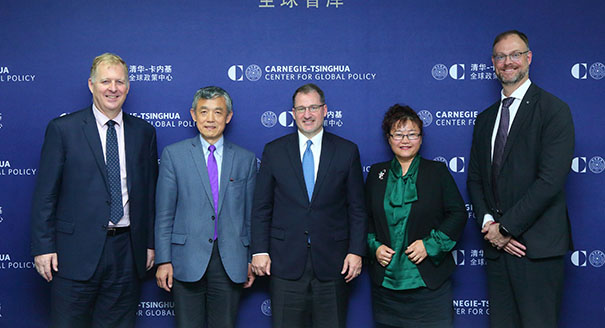Registration
You will receive an email confirming your registration.
As the United States retreats from its traditional leading global governance role under President Trump, many argue that China is trying to fill the void. Beijing’s Asian Infrastructure Investment Bank and Belt and Road Initiative highlight the need for new approaches to global infrastructure investment and interregional economic development. Within the context of the U.S.-China competition for geopolitical influence, how will global governance evolve in the coming decade? Will the traditional international order integrate China’s initiatives or push back, thereby creating two different systems? Finally, how should multilateral organizations navigate and recast this new environment?
As the first part of the third annual Carnegie–Tsinghua Global Governance Conference, Carnegie–Tsinghua Center Director Paul Haenle moderated a discussion with Chinese and international experts on how the global governance regime can transform to effectively respond to contemporary realities.
This event was off the record.
Discussion highlights
- The Changing Global Landscape: The panelists agreed that different international values and systems have made multilateral collaboration and cooperation increasingly difficult. Existing institutions are not equipped to address complexities brought on by technological progress and globalization, among other transnational forces. Furthermore, President Trump’s dramatic restructuring of U.S. foreign policy has left a void in global governance, and many other Western countries seem unwilling or unable to fill the gap. This has given China an opportunity to expand its role on the global stage. Though international cooperation is precarious in today’s world, one discussant noted that there is great potential for the rejuvenation of global governance through reevaluating and updating existing multilateral institutions such as the International Monetary Fund, the World Bank, and the United Nations.
- Emerging Challenges: As the world develops and globalization continues, new issues are challenging traditional global governance mechanisms, such as climate change and data governance. Discussants noted that the global governance regime, as currently constructed, is unable to properly regulate emerging technologies that are changing how societies and economies function. They also pointed out that the overlapping missions of various policymaking organizations further complicate regulation. Many global governance organizations work on the same issues but often have conflicting ideas, objectives, and capacities.
- China’s Changing Role: The panelists discussed how China’s growing global footprint and desire to more deeply embed itself in the international system is changing the global governance regime. They agreed that, so far, China has worked within the existing global system, which has served its interests and spurred its rise. The question, however, is whether China will continue integrating into the existing system or try to establish its own rules and norms for global governance given its growing economic power and political influence. Some discussants argued that Beijing, by making infrastructure a central part of its policy agenda, has refocused the international community on the need to spend money on infrastructure development projects.
- The Path Forward: The discussants agreed that solving contemporary global issues will require more than increasing infrastructure spending. The international community must acknowledge that new challenges, especially those related to security and technology, must be addressed through a more agile global governance regime. Rather than focusing efforts on finding political consensus, countries should move forward by building a new framework based on shared values and interests. Adapting collaboration and cooperation mechanisms should ultimately lead to the creation of a new, improved style of global governance.
Paul Haenle
Paul Haenle holds the Maurice R. Greenberg Director’s Chair at the Carnegie–Tsinghua Center for Global Policy based at Tsinghua University in Beijing. His research focuses on Chinese foreign policy and U.S.-China relations.
Xue Lan
Xue Lan is Cheung Kong Chair distinguished professor and dean of Schwarzman College at Tsinghua University.
Benedict Bingham
Benedict Bingham is country director for China at the Asian Development Bank.
He Wenping
He Wenping is professor and research program director at the Institute of West-Asian and African Studies at the Chinese Academy of Social Sciences.
David Aikman
David Aikman is China chief representative officer and member of the Executive Committee, World Economic Forum Beijing.
